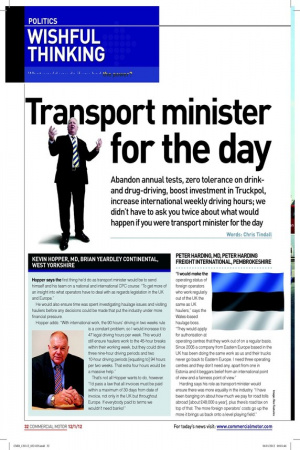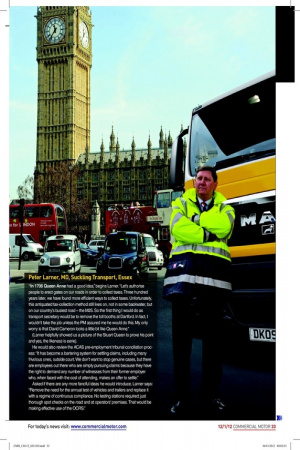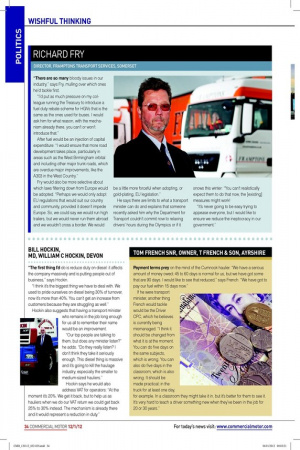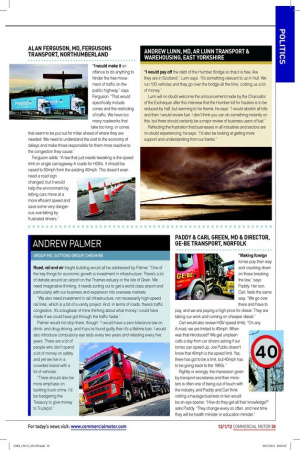POLITICS
Page 23

Page 24

Page 25

Page 26

If you've noticed an error in this article please click here to report it so we can fix it.
WISHFUL THINKING
What would you do if you had the power?
Transport minister
for the day
Abandon annual tests, zero tolerance on drinkand drug-driving, boost investment in Truckpol, increase international weekly driving hours; we didn’t have to ask you twice about what would happen if you were transport minister for the day
Words: Chris Tindall KEVIN HOPPER, MD, BRIAN YEARDLEY CONTINENTAL, WEST YORKSHIRE
Hopper says the first thing he’d do as transport minister would be to send himself and his team on a national and international CPC course: “To get more of an insight into what operators have to deal with as regards legislation in the UK and Europe.” He would also ensure time was spent investigating haulage issues and visiting hauliers before any decisions could be made that put the industry under more financial pressure.
Hopper adds: “With international work, the 90 hours’ driving in two weeks rule is a constant problem, so I would increase it to 47 legal driving hours per week. This would still ensure hauliers work to the 45-hour breaks within their working week, but they could drive three nine-hour driving periods and two 10-hour driving periods [equating to] 94 hours per two weeks. That extra four hours would be a massive help.” That’s not all Hopper wants to do, however. “I’d pass a law that all invoices must be paid within a maximum of 30 days from date of invoice, not only in the UK but throughout Europe. If everybody paid to terms we wouldn’t need banks!”
PETER HARDING, MD, PETER HARDING FREIGHT INTERNATIONAL, PEMBROKESHIRE
“I would make the operating status of foreign operators who work regularly out of the UK the same as UK hauliers,” says the Wales-based haulage boss. “They would apply for authorisation at operating centres that they work out of on a regular basis. Since 2005 a company from Eastern Europe based in the UK has been doing the same work as us and their trucks never go back to Eastern Europe. I need three operating centres and they don’t need any, apart from one in Estonia and it beggars belief from an international point of view and a fairness point of view.” Harding says his role as transport minister would ensure there was more equality in the industry. “I have been banging on about how much we pay for road tolls abroad [about £48,000 a year], plus there’s road tax on top of that. The more foreign operators’ costs go up the more it brings us back onto a level playing field.”
Peter Larner, MD, Suckling Transport, Essex
“In 1706 Queen Anne had a good idea,” begins Larner. “Let’s authorise people to erect gates on our roads in order to collect taxes. Three hundred years later, we have found more efficient ways to collect taxes. Unfortunately, this antiquated tax-collection method still lives on, not in some backwater, but on our country’s busiest road – the M25. So the first thing I would do as transport secretary would be to remove the toll booths at Dartford. In fact, I wouldn’t take the job unless the PM assured me he would do this. My only worry is that David Cameron looks a little bit like Queen Anne.” (Larner helpfully showed us a picture of the Stuart Queen to prove his point and yes, the likeness is eerie).
He would also review the ACAS pre-employment tribunal conciliation process: “It has become a bartering system for settling claims, including many frivolous ones, outside court. We don’t want to stop genuine cases, but there are employees out there who are simply pursuing claims because they have the right to demand any number of witnesses from their former employer who, when faced with the cost of attending, makes an offer to settle.” Asked if there are any more fanciful ideas he would introduce, Larner says: “Remove the need for the annual test of vehicles and trailers and replace it with a regime of continuous compliance. No testing stations required; just thorough spot checks on the road and at operators’ premises. That would be making effective use of the OCRS.”
RICHARD FRY
DIRECTOR, FRAMPTONS TRANSPORT SERVICES, SOMERSET “There are so many bloody issues in our industry,” says Fry, mulling over which ones he’d tackle first.
“I’d put as much pressure on my colleague running the Treasury to introduce a fuel duty rebate scheme for HGVs that is the same as the ones used for buses. I would ask him for what reason, with the mechanism already there, you can’t or won’t introduce that.” After fuel would be an injection of capital expenditure: “I would ensure that more road development takes place, particularly in areas such as the West Birmingham orbital and including other major trunk roads, which are overdue major improvements, like the A303 in the West Country.” Fry would also be more selective about which laws filtering down from Europe would be adopted. “Perhaps we would only adopt EU regulations that would suit our country and community, provided it doesn’t impede Europe. So, we could say we would run high trailers, but we would never run them abroad and we wouldn’t cross a border. We would be a little more forceful when adopting, or gold-plating, EU legislation.” He says there are limits to what a transport minister can do and explains that someone recently asked him why the Department for Transport couldn’t commit now to relaxing drivers’ hours during the Olympics or if it snows this winter: “You can’t realistically expect them to do that now, the [existing] measures might work!
“It’s never going to be easy trying to appease everyone, but I would like to ensure we reduce the ineptocracy in our government.”
BILL HOCKIN, MD, WILLIAM C HOCKIN, DEVON
“The first thing I’d do is reduce duty on diesel: it affects the company massively and is putting people out of business,” says Hockin.
“I think it’s the biggest thing we have to deal with. We used to pride ourselves on diesel being 30% of turnover, now it’s more than 40%. You can’t get an increase from customers because they are struggling as well.” Hockin also suggests that having a transport minister who remains in the job long enough for us all to remember their name would be an improvement.
“Our top people are talking to them, but does any minister listen?” he adds. “Do they really listen? I don’t think they take it seriously enough. This diesel thing is massive and it’s going to kill the haulage industry, especially the smaller to medium-sized hauliers.” Hockin says he would also address VAT for operators: “At the moment it’s 20%. We get it back, but to help us as hauliers when we do our VAT return we could get back 25% to 30% instead. The mechanism is already there and it would represent a reduction in duty.”
TOM FRENCH SNR, OWNER, T FRENCH & SON, AYRSHIRE
Payment terms prey on the mind of the Cumnock haulier. “We have a serious amount of money owed; 45 to 60 days is normal for us, but we have got some that are 90 days. I would like to see that reduced,” says French. “We have got to pay our fuel within 15 days now.” If he were transport minister, another thing French would tackle would be the Driver CPC, which he believes is currently being mismanaged. “I think it should be changed from what it is at the moment.
You can do five days on the same subjects, which is wrong. You can also do five days in the classroom, which is also wrong. It should be made practical; in the truck for at least one day, for example. In a classroom they might take it in, but it’s better for them to see it.
It’s very hard to teach a driver something new when they’ve been in the job for 20 or 30 years.”
ALAN FERGUSON, MD, FERGUSONS TRANSPORT, NORTHUMBERLAND
“I would make it an offence to do anything to hinder the free movement of traffic on the public highway,” says Ferguson. “That would specifically include cones and the restricting of traffic. We have too many roadworks that take too long, or cones that seem to be put out for miles ahead of where they are needed. We need to understand the cost to the economy of delays and make those responsible for them more reactive to the congestion they cause.” Ferguson adds: “A law that just needs tweaking is the speed limit on single carriageway A roads for HGVs. It should be raised to 50mph from the existing 40mph. This doesn’t even need a road sign changed, but it would help the environment by letting cars move at a more efficient speed and save some very danger ous overtaking by frustrated drivers.”
ANDREW LUNN, MD, AR LUNN TRANSPORT & WAREHOUSING, EAST YORKSHIRE
“I would pay off the debt of the Humber Bridge so that it is free, like they are in Scotland,” Lunn says. “It’s something relevant to us in Hull. We run 100 vehicles and they go over the bridge all the time, costing us a lot of money.” Lunn will no doubt welcome the announcement made by the Chancellor of the Exchequer after this interview that the Humber toll for hauliers is to be reduced by half, but warming to his theme, he says: “I would abolish all tolls and then I would review fuel. I don’t think you can do something instantly on this, but there should certainly be a major review of business users of fuel.” Reflecting the frustration that businesses in all industries and sectors are no doubt experiencing, he says: “I’d also be looking at getting more support and understanding from our banks.”
ANDREW PALMER
GROUP MD, SUTTONS GROUP, CHESHIRE Road, rail and air freight building would all be addressed by Palmer. “One of the key things for economic growth is investment in infrastructure. There’s a lot of debate around an airport on the Thames estuary or the Isle of Grain. We need imaginative thinking, it needs sorting out to get a world class airport and particularly with our business and expansion into overseas markets.
“We also need investment in rail infrastructure, not necessarily high-speed rail links, which is a bit of a vanity project. And, in terms of roads, there’s traffic congestion. It’s a bugbear of mine thinking about what money I could have made if we could have got through the traffic faster.” Palmer would not stop there, though: “I would have a zero-tolerance law on drinkand drug-driving, and if you’re found guilty then it’s a lifetime ban. I would also introduce compulsory eye tests every two years and retesting every five years. There are a lot of people who don’t spend a lot of money on safety and yet we live in a crowded island with a lot of vehicles.
“There should also be more emphasis on tackling truck crime; I’d be badgering the Treasury to give money to Truckpol.”
PADDY & CARL GREEN, MD & DIRECTOR, GE-BE TRANSPORT, NORFOLK
“Making foreign lorries pay their way and cracking down on those breaking the law,” says Paddy. Her son, Carl, feels the same way: “We go over there and have to pay, and we are paying a high price for diesel. They are taking our work and running on cheaper diesel.” Carl would also review HGV speed limits. “On any A-road, we are limited to 40mph. When was that introduced? We get umpteen calls a day from car drivers asking if our lorries can speed up; Joe Public doesn’t know that 40mph is the speed limit. Yes, there has got to be a limit, but 40mph has to be going back to the 1960s.” Rightly or wrongly, the impression given by transport secretaries and their ministers is often one of being out of touch with the industry, and Paddy and Carl think visiting a haulage business or two would be an eye opener. “How do they get all their knowledge?” asks Paddy. “They change every so often, and next time they will be health minister or education minister.”












































